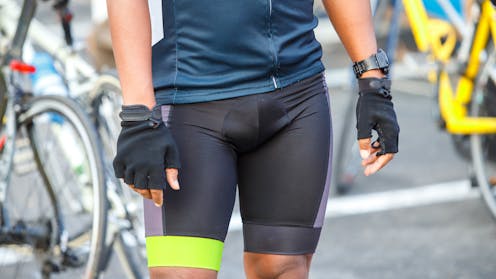Summer long balls? A health expert explains why hot weather can be tough on testicles
The phrase “summer long balls” might sound like locker-room slang, but it’s increasingly being mentioned on social media and online forums as a seasonal curiosity. In hot weather, men’s scrotums which contain their testicles can appear looser or more pendulous – hence the name.
Male readers may have noticed how the testes sometimes seem to hang lower in the summer, yet retreat upwards with the slightest cooling breeze. (I’ll stick with the term testes for anatomical accuracy, although we all know the slang terms are many and varied.)
While you may think of rising and falling as the domain of soufflés, when it comes to testes, their ability to move up and down is a key part of an elegant, biological temperature-control system.
For some, low-hanging testes are simply a cosmetic issue affecting swimwear choices or confidence, but others can suffer discomfort. Supportive underwear may help, although finding the right fit might require more effort than your average trip to Calvin Klein.
To understand what’s going on in male bodies, we need to go back to the beginning. Both testes and ovaries start life in the abdomen and migrate downward. But whereas the journey for ovaries stops in the pelvis, testes go further, exiting the abdominal cavity entirely to reside in the scrotum – a move that’s crucial for sperm production.
The testes produce and mature sperm cells and generate androgens, such as testosterone, which govern sexual development and behaviour. These processes are temperature-sensitive. Inside the pelvis is too warm for optimal sperm production – hence the descent to the cooler scrotum, usually in teenage years when your “balls drop”.
But to reach the scrotum, testes must pass through layers of the abdominal wall. Sometimes this journey doesn’t go as planned, resulting in an undescended testis, where one (or both) remain stuck in the abdomen or groin. Surgery may be required to correct this.
Even when testes do land in the right place, they don’t stay still. The scrotum and surrounding tissues adjust their position in response to temperature. That’s where the cremasteric muscle comes in. Found within the spermatic cord, it can contract and pull the testes closer to the body when needed – for warmth and perhaps protection.
One strange but testable reflex? Try stroking the inner thigh. If functioning normally, the testis on that side will rise slightly. This reflex can also be affected by neurological disease or testicular torsion, a surgical emergency.
The dartos muscle, located in the scrotal wall, plays a similar role. When temperatures drop it contracts, drawing the testes up for warmth. In heat, it relaxes – lowering the testes and helping them cool off.
Fertility issues
This thermal sensitivity is critical for fertility. Sustained overheating can impair sperm quality, which is why an undescended testis stuck in the abdomen or groin requires an operation.
Similarly, men who are struggling to conceive may be advised to avoid tight underwear or cycling shorts, switch to looser boxers, and reduce time spent cycling because of saddle friction.
The heat, pressure and tight fit of padded cycling shorts have all been suggested as potential risks to sperm health – though the evidence remains inconclusive. It’s not necessarily the padding but rather the compression and sustained heat in the groin area that may affect testicular function.
Temperature regulation doesn’t stop there. The pampiniform plexus, a network of veins around the testicular artery, acts like a radiator. It draws heat from arterial blood to cool it before it reaches the testes, preventing overheating.
Sometimes, these veins swell into a varicocele — a condition often described as feeling like a “bag of worms”. It becomes more noticeable when standing and affects around 15% of men. While often harmless, this can also affect fertility through loss of heat regulation. Some patients may also notice a dull ache in the testes, particularly after exercise or at the end of the day.
So, “summer long balls” are rooted in real physiology. During hot weather, a relaxed dartos muscle and loose scrotal skin allow the testes to hang lower – sometimes enough to notice a visible difference. If that’s true for you, this isn’t a malfunction but your body doing exactly what it’s supposed to. While this condition might sound like something from a comedy sketch, it’s actually a sign your reproductive system is working as nature intended.
Get your news from actual experts, straight to your inbox. Sign up to our daily newsletter to receive all The Conversation UK’s latest coverage of news and research, from politics and business to the arts and sciences.
Dan Baumgardt does not work for, consult, own shares in or receive funding from any company or organisation that would benefit from this article, and has disclosed no relevant affiliations beyond their academic appointment.



